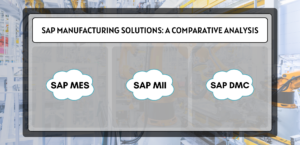Business intelligence (BI) allows software and services to interpret data into actionable courses that tell a company’s tactical and strategic business decisions. But it is any good for the manufacturers? Well, it’s precious.
In this article, we will tell you how the implementation of business intelligence in the manufacturing industry can help you disrupt the industry.
Manufacturing and Business Intelligence: Understanding the Connection
Businesses face challenges in implementing business intelligence for production due to the complex nature of manufacturing processes, which involve multiple steps in generating and organizing product modules. Hence, producing companies often keep discovering ways to pave their task more effectively.
Success Case: Deploying Next-Gen Business Intelligence Solution For Telecommunications Industry
BI tools facilitate the interpretation of structured and unstructured data into valuable insights. This data goes beyond revealing sales processes and issues; it also sheds light on consumer profiles and enables companies to optimize their offerings to meet customer demands.
Furthermore, analytics and data play a pivotal role in enhancing operational effectiveness and streamlining business procedures. Manufacturing companies can leverage these tools to reduce the time spent on pre-execution procedure inspections, thereby maximizing efficiency.
How BI changes the Manufacturing Processes?
BI gives manufacturers to analyze the current data and information that maybe have been safely transferred across the different factory levels and accumulate it into a convenient enabling source. There, discrete sections can be enabling the data they require to execute decisions relevant to their field.
Also Read: The Strategizing Part for Manufacturing Sector – Tips for Futuristic and Sustainable Planning
At the consequent time, the head of areas and management can inspect to make sure the complete systems are carried out at the peak of productivity.
While producers may also spend a big amount of attention in order to maintain the machinery and train people, it often comes down to putting the same diligence into their business intelligence procedures. This shortage of commitment to accumulation and assessing information can lead to manufacturing delays and cost re-runs.
Use Cases of Business Intelligence in the Manufacturing Industry
Below are a few use cases of business intelligence in the manufacturing industry:
- Efficient management of your supply chain
The company calculates its supply chain stats and interprets data often to make sure timely delivery and provide better services. This supports the company to track the package costs. With improved insights about every package, you can calculate shipment growth and compromise within the contracts.
Also Read: Deploying Intelligent Supply Chain – Why is it Crucial and How it helps the businesses?
BI can help you evaluate transportation expenditures, repair, and many more with the help of its efficient supply chain management. It provides companies with productive insights and interpretations based on real-time and past data to improve business operations. It also supports you in realizing the machinery problems and allows you to get them proactively.
Tracing the performance of the company’s machines and sections enables people to decrease and solve mistakes within the manufacturing cycle. Transferring and receiving can also put them the requirement to demand raw materials for peak effectiveness and grow the chances to fulfill order demands.
- Predictive analytics makes you proactive
In the realm of business intelligence, the ability to predict market trends and consumer behavior is crucial. By leveraging analytics, companies can uncover valuable insights into patterns and behaviors, empowering them to take proactive measures to enhance production operations. Predictive analytics also allows for proactive planning of maintenance and service, preventing downtime and ensuring optimal performance.
- Evaluate equipment effectiveness
There are a slew of reasons that result in inefficient manufacturing. Issues coming out of machinery because of installation, poor maintenance, and regular downtime, affect manufacturing severely. In order to maintain the functioning of production management, it is essential to keep an eye on these reasons.
The assimilation of business intelligence and data analytics in production supports you to be informed about the health of your equipment. It provides the company with current data on the operation of your production. Eventually, Business Intelligence supports streamlining the company’s task charts in your manufacturing unit.
- Demand forecasting
Accurate demand forecasting is vital for planning manufacturing, supply chain activities, and inventory management. By incorporating information analytics and leveraging historical data, businesses can obtain a comprehensive view of their data, allowing for precise alignment of operations and reducing manufacturing waste.
Business intelligence can be utilized to track downtime across employees, departments, and machines, highlighting areas that require improvements. Predictive analysis can help anticipate and prevent production errors, leading to enhanced productivity.
- Optimize financial management
Companies can use it in production for interpreting the data of departments, like inventory, sales, and assets. This provides the exact reasons and output from each department or section. It gives you the researched cheap and cost-benefitting analysis, of which you can pave new roads to generate revenue and save money.
Many Producers need to follow the safety and rules requirements. It enables the producer to maintain better standards and provide them to the customers. The important factor about this intelligence in improving the production procedures is that checking and growing all the components results in long-term betterment in profitability.
The Impact of BI Implementation
Business Intelligence and analytics data help the organization improve its operations, and procedures and decide restrictions more thoughtfully. It can guide you for automation as well as managerial tasks throughout. To summarize, BI will change:
- How You hold with your customers: In any case whether you’re B2C or B2B, your customers care about quality, delivery, cost, and predictability. Using BI, producers can minimize every step of the production process, by ensuring operations delivery costs and quality control, are managed at maximum effectiveness. And when it’s not, the individual required will be the first to be warned knowing the same data is available.
- How You Equip Your Employees: Design mistakes manufacturing, accounting mistakes. Decimate the mistake of the blame game by providing each employee should be shared data of the progress made so far against the set goals. Identifying mistakes will help you reduce troubles and equips management to take important decisions.
- How You Take Action: Companies can avoid delays in decision-making by having real-time visibility instead of dealing with a pile-up of reports. Power BI empowers businesses to proactively address fundamental issues impacting manufacturing units or production lines, allowing them to prioritize important matters without being pressured by urgent issues in the office.
- How You Optimize Operations: Automating data inventory ensures a reliable, centralized source of compressed data. This enables authorities and executives to access the data seamlessly, streamlining inventory management, reducing waste, and improving data processing speed.
Also Read: Augmenting the Tactics of Business Intelligence in Manufacturing Industry
Conclusion
Business Intelligence clears the picture for users with valuable data and experience in business procedures. It supports you to solve issues swiftly, it provides to predict the ongoing demands for inventory and resources demands. The production area is positively copying BI in all of its management. Companies are seeking to maximize their hard procedures and capitalize on their turnover yearly.
The accumulation of BI in manufacturing is building various ways of revealing intelligence and making it accessible. Business intelligence evolves with business needs and technology, integrating AI insights into broader strategies.
BI software platforms enhance individual functions, adding value to businesses by providing comprehensive capabilities for sales tracking and offering insights into profit forecasts and customer behavior.
Seeking expert advice on where business intelligence can help your manufacturing units and business, or need BI solution, development experts? Stridely can help you in both cases. Let’s connect to upgrade your business’s stature in the market.






